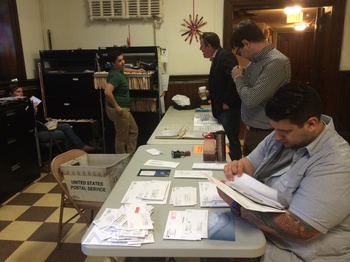In the tiny town of Danby, Vermont, everyone flocks to the post office to hear what's going on. It's not about the mail -- it's where Danby goes to be Danby. It's where the social connective tissue thrives. It's where Philadelphia pastor Bill Golderer bonds with his father-in-law when the family visits.
When Bill took over the Broad Street Ministry in Philadelphia eight years ago, he was determined to signal that the shuttered Gothic church was reopening under new management. Committed to fostering a diverse and open ministry, his priority was to make everyone feel welcome. He had not counted on the fact that the people who most needed to feel welcome -- the city's homeless population -- would take him up on this offer.
Trained in a more traditional church model of maintaining a base of subscribers, Bill saw this as a disguised opportunity. Golderer likens churches to the hospitality industry. He refers to those he serves as "guests," and sees them as people who truly need a hospitable welcome. Without help, homeless people would remain outsiders instead of being restored to society.
Using the hospitality model, Bill asked his "guests" what they needed. The guests asked for help with their mail.
Because of those trips to Danby, Bill understands mail as a metaphor. It is the first step toward establishing an identity as a citizen and a neighbor. You need an address for benefits, job applications, legal notices and a range of reasons that weave together to tie a person to a place. With an address, you have a stake in your community.
Bill headed over to Staples to buy 50 manila file folders to hold the mail. When he told the clerk what he was doing, she donated a file box to house them. Word travels fast in the "guest" social network, so in a short time, over 1900 guests signed up to receive mail at this site. Bill welcomed them all.
The Broad Street Ministry mail room sometimes feels like the Danby Post Office. Its guests are used to being let down by the world, but they can count on the mail room. Bill hired a "Postmaster General" -- a young AmeriCorps volunteer, chosen for her trusting temperament and curiosity -- to watch over this safe haven. She has become a friend and advocate for the guests.
When you see someone's mail, you can get an idea of what keeps them from flourishing. A stack of medical bills means poor health. A pile of IRS correspondence probably means money trouble. A summons can mean jail.
The Postmaster General observes and sometimes comments gently to open a dialog. Recently when she did this with a guest, she learned that a debt he had ignored twenty years ago had compounded by inattention and the shame he felt about it. His livelihood was gone and his benefits had been seized. He assumed that the problem was insurmountable. The Postmaster linked him up with an attorney who was able to dig down and resolve the problem.
Eventually, two welcome pieces of mail arrived. The guest smiled as he showed the Postmaster the IRS letter proving that all debts had been satisfied. The other envelope held a plane ticket. Before this debt, the guest's greatest joy was travel. Finally, he would take his first trip in 21 years. He told the Postmaster, "I feel like I just got out of prison!"
The Pastor came to understand that his guests need services, not sermons. The mailboxes are a concrete step toward resolving a seemingly insurmountable problem.
When asked what others can do to help, he said:
Engage in volunteering in such a way that you're not just performing a task. Engage in a way that allows you to know the person. Every person I have met here could have a life-changing intervention if someone were involved in a sustainable way. A day of service may build morale but probably will not change the world. If you want to change the world, build sustained and unlikely relationships.
The pastor's present: unlikely relationships and common sense solutions.
Thus endeth today's lesson.
My work mobilizes professionals to serve the community. Over the years, students have shared private moments of deep connection and wonder that stop me in my tracks. Wonder and a sense of possibility dwell in the hearts of leaders who inspire. With permission, I am pulsing this wonder out into the world by sharing these secret moments with you.
If we look for it, wonder is all around us. Where do you find it?
Where is the wonder in your work?
